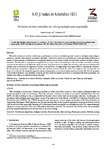Mostrar o rexistro simple do ítem
Evolution of robot controllers for solving multiple tasks sequentially
| dc.contributor.author | Sendra-Arranz, Rafael | |
| dc.contributor.author | Gutiérrez, Álvaro | |
| dc.date.accessioned | 2023-10-09T14:47:07Z | |
| dc.date.available | 2023-10-09T14:47:07Z | |
| dc.date.issued | 2023 | |
| dc.identifier.citation | Sendra-Arranz, R., Gutiérrez, Á. 2023. Evolution of robot controllers for solving multiple tasks sequentially. XLIV Jornadas de Automática, 738-743. https://doi.org/10.17979/spudc.9788497498609.738 | es_ES |
| dc.identifier.isbn | 978-84-9749-860-9 | |
| dc.identifier.uri | http://hdl.handle.net/2183/33672 | |
| dc.description.abstract | [Resumen] El cambio de tarea en robótica evolutiva es un problema en cual los robots deben aprender a resolver múltiples tareas independientes y a cambiar entre ellas en el momento adecuado. Cuando los robots son controlados por redes neuronales artificiales, el cambio de tarea aumenta notablemente en complejidad debido a que el mismo modelo neuronal debe codificar multiples comportamientos. En este artículo se propone un experimento en el que robots controlados por redes neuronales recurrentes en tiempo continuo deben resolver un problema de cambio de tarea. Los parámetros y topología del controlador neuronal son evolucionados mediante una combinación del algoritmo evolutivo NeuroEvolution of Augmenting Topologies (NEAT) y aprendizaje Hebbiano. En el experimento propuesto, el grupo de robots debe resolver secuencialmente las tareas de (i) seguir lo más cerca posible una fuente de luz móvil y (ii) transportar pequeños objetos y depositarlos en una zona de almacenamiento común. El orden de ejecución de las tareas es aleatorio. Los resultados muestran que los robots son capaces de resolver correctamente las tareas propuestas y de cambiar entre ellas en el instante de tiempo adecuado. | es_ES |
| dc.description.abstract | [Abstract] Task switching in evolutionary robotics is a problem in which robots have to learn to solve multiple independent tasks and switch among them at the correct timing. When the robots are controlled by means of an evolved Artificial Neural Network (ANN), the task switching is utterly complexified as the same neural model must encode multiple behaviors. In this paper, we addressed a task switching experiment using a group of homogeneous robots that are controlled by Continuous-Time Recurrent Neural Networks (CTRNN). The CTRNN parameters and topology are evolved using a combination of the NeuroEvolution of Augmenting Topologies (NEAT) algorithm and Hebbian learning rules. In the proposed experiment, the group of robots is evolved with the aim of solving sequentially the tasks of (i) following as closely as possible a mobile light source and (ii) transporting small objects to a common nest area. The order of the tasks is determined randomly. The results showed that the robots can successfully solve the proposed tasks and switch between them at the correct timing. | es_ES |
| dc.language.iso | eng | es_ES |
| dc.publisher | Universidade da Coruña. Servizo de Publicacións | es_ES |
| dc.relation.uri | https://doi.org/10.17979/spudc.9788497498609.738 | es_ES |
| dc.rights | Attribution-NonCommercial-ShareAlike 4.0 lnternational (CC BY-NC-SA 4.0) https://creativecommons.org/licenses/by-ncsa/4.0/ | es_ES |
| dc.rights.uri | http://creativecommons.org/licenses/by-nc-sa/3.0/es/ | * |
| dc.subject | Algoritmos evolutivos | es_ES |
| dc.subject | Robótica inteligente | es_ES |
| dc.subject | Redes neuronales | es_ES |
| dc.subject | Cambio de tarea | es_ES |
| dc.subject | Sistemas multi-agente | es_ES |
| dc.subject | Aprendizaje Hebbiano | es_ES |
| dc.subject | Evolutionary algorithms | es_ES |
| dc.subject | Intelligent robotics | es_ES |
| dc.subject | Neural networks | es_ES |
| dc.subject | Task switching | es_ES |
| dc.subject | Multi-agent systems | es_ES |
| dc.subject | Hebbian learning | es_ES |
| dc.title | Evolution of robot controllers for solving multiple tasks sequentially | es_ES |
| dc.type | info:eu-repo/semantics/conferenceObject | es_ES |
| dc.rights.access | info:eu-repo/semantics/openAccess | es_ES |
| UDC.startPage | 738 | es_ES |
| UDC.endPage | 743 | es_ES |
| dc.identifier.doi | https://doi.org/10.17979/spudc.9788497498609.738 | |
| UDC.conferenceTitle | XLIV Jornadas de Automática | es_ES |






